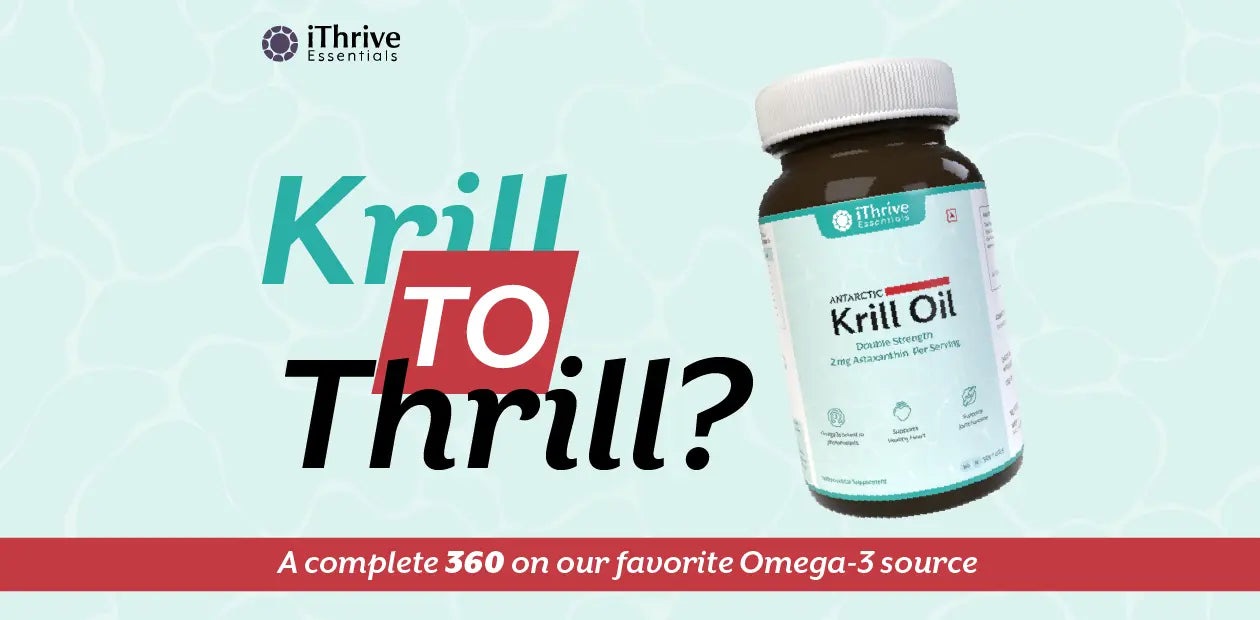
DO YOU HAVE THE Krill to Thrill?
A complete 360 on our favorite Omega-3 source - Krill Oil
Sourced deep from the unbreached depths of the Antarctic, these tiny crustaceans are a key part of the ocean’s living system; found in such abundance, they tinge the red into the sea.
Krill Oil, a fatty acid supplement, is a softened, gel-based capsule reddened with the glow of its shell. Omega-3 fatty acids are often found in your food, such as fish oil and flaxseed, empowering the decrease of those pesky triglyceride levels your cardiologist is always on about. Omega-3s can also lessen the risk of several chronic health disorders, ranging from breast cancer to Alzheimer’s disease. Krill Oil in particular, is known for reducing inflammation, lowering cholesterol levels and improving one’s ADHD.
The Antarctic Krill Oil is based off of a species so profound, without them, an entire ecosystem would collapse. Pressed out of the shell of the world’s most abundant crustacean, Krill Oil is harvested with a net almost of the size of a football field. Carefully extracted from these industrial ‘traps,’ Krill Oil fisheries immediately process the catch - dehydrating the source in order to cold-press - peeling the carapace for its precious resource. Polyunsaturated fatty acids make up about 19% of the total acids in krill oil, its stability making it a very attractive source of Omega-3 itself.
So, is all the ‘Krilling’ really worth it?
Euphausia superba, also known as the Antarctic krill, is a species exclusively found within the Southern Ocean. It is arguably one of the most sought-after crustacean in the entire ecosystem body, a vital source of energy for animals like the Blue Whale.
About 200,000 tonnes of krill is derived from its annual global harvest, with industrial giants like Russia and Norway investing an approximate of $640 million to simply kickstart a krill-oil fishery.
Primitively used for aquaculture, now booming dietary markets boast Krill Oil as a powerful nutraceutical supplement, its higher bioavailability monetising it as a convenient alter-ego to our fish oil reserves. Depleting fish stocks also contribute as a factor to almost 1% of the total krill composite being harvested recurrently, the fish industry’s non-transparency advocating the switch to krill. Although the percentages may not seem very high, a recent study indicates that krill populations are projected to decline by almost 30% by the end of this century.
Conservationists are sounding the alarm over the international race to exploit the Antarctic's krill swarms, with fisheries fishing over and over in certain areas close to coast and depleting the feed for penguins and whales at a fairly common & alarming rate.
The current standard for Krill Oil in India is 500 mg per serving, a lowered concentration for a premium price. Serving the market payroll, brands are non-transparent, eliminating the where and how from where they bring their source. iThrive’s Krill Oil is 1000 mg per softgel, every capsule guaranteeing a greater health to us.
Okay but, What’s In My Capsule?
With a serving of 2 soft gels, (or as recommended by your physician), does one really get the supplementation one requires per day? Read on to find more about what you invite into your body, and what your supplement really encapsulates.
Your iThrive Krill Oil can help supplement you & your loved ones by the provision of certain nutrients you may not have known existed. These include -
- Phospholipids
Smelling fishy? Your Krill Oil does too! Phospholipids are the reason why you have no fishy aftertaste in your capsule.
A phospholipid is a major component of the plasma membrane, found in all outer layers of an animal cell. If you’re made of cells, you’re made of phospholipids too.
Marine omega phospholipids are high in krill oil, namely those in particular: EPA and DHA. These phospholipids allow its transfer in oil, allowing for higher bioavailability of the fatty acids itself.
- Omega 3s
The three main omega-3 fatty acids are alpha-linolenic acid (ALA), eicosapentaenoic acid (EPA), and docosahexaenoic acid (DHA). ALA is an essential fatty acid, meaning that your body can’t make it, so you must get it from the foods and beverages you consume.
Your body can convert some ALA into EPA & DHA later on, but this can be done in very small amounts. Therefore, getting EPA and DHA from foods and dietary supplements is the only practical way to increase n-3 levels in your body.
iThrive’s Krill Oil is a supplement rich in n-3, boosting immunity, vision and your overall heart health. Omega-3s help treat cancer, Alzheimer's, and your infant’s health too; Krill Oil becoming the epitome to all your wellness needs.
- Choline
Choline, a unique compound in your body, is used in multiple forms in order for smooth functioning of our different bodily systems. It serves as a precursor to the neurotransmitter acetylcholine, hailed as important for cognitive regulation.
Choline helps in keeping one’s heart and blood vessels healthy, and is present in all tissues of the human body. What truly sets Krill Oil apart is the unique synergy between Astaxanthin and Choline, the interplay between these two compounds creating a powerhouse within the nutritional field.
- Astaxanthin
Astaxanthin, a xanthophyll carotenoid, is naturally synthesized by a number of primitive bacteria, microalgae, and yeasts. A powerful antioxidant, it is found as a vibrant pigment in certain fish like krill and plankton, injecting them with an orange-red hue onto their otherwise transparent shape.
Astaxanthin has a capability of neutralizing harmful free-radicals; those vexing, notorious molecules that implicate cellular damage and aging. This in turn enhances skin elasticity, promoting joint health and a healthier, youthful inner you.
Enriched with 2 mg Astaxanthin per serving, iThrive’s Krill Oil holds a unique lipid-soluble antioxidant property, making it a much better alternative to fish oil itself.
Can we really compare Krill Oil to Fish Oil? Read on to find out.
Fish Oil vs Krill Oil: Which Fish Wins?
Krill Oil contains two of the same essential fatty acids as fish oil (eicosapentaenoic acid, or EPA, and docosahexaenoic acid, or DHA). Krill Oil however, has a higher bioavailability, i.e. the rate of absorption of these essential fatty acids is higher as compared to the first.
The EPA and DHA are bound to phospholipids in Krill Oil, manufactured in greater abundance for its use by our body. The amount of Astaxanthin in Krill Oil is also relatively higher, giving Krill Oil the edge over fish with its antioxidant property.
Fish Oil is known for its own concern, with a higher concentration of pollutants itself, caused by the ingestion of certain prominent contaminants ranging from stranded fibers to plastic nets in the sea. Krill is found in the deeper depths of the ocean, reducing the chances of toxicity and pollutants corroding its oil, and increasing its benefits as a health supplement overall.
The Actual Benefits of Krill Oil
It is safe to say the Omega-3 derived from Krill Oil offers a complete 360° insight within our body’s overview. Krill Oil has several health benefits, ranging from maintaining your cardiovascular health to preventing skin and eye disease.
How to Incorporate Krill Oil into Your Daily Diet?
The health benefits of Omega-3 fatty acids are not of an immediate effect, and are perpetually dependent on its long-term use. Krill Oil can be found in forms of supplements sold as a capsule or a liquid, to be taken as per the recommendation of one’s doctor or physician.
Like fish oil, the recommended dosage of krill oil is based on the amount of DHA and EPA found in the supplement. The current standard for Krill Oil in India is 500-600 mg per serving. This is a considerably low concentration of oil for a premium price.
Our recommendation is iThrive’s Krill Oil which comes with 1000mg Krill Oil per capsule.
Not only will this meet all your supplementary needs, it will also help you believe in iThrive’s holistic approach. Our goal for wellness leads us to curate our supplements from the finest of resources, our range of Essentials being a one-stop-solution for you.
One can take one’s supplement along with their meal or snack containing dietary fat. This can help increase the absorption of DHA and EPA, reducing the risk of gastrointestinal side effects as well.
Are there any Risk Factors accompanying Krill Oil?
Warnings issued by the FDA note that certain fish (marlin, tuna, swordfish) may contain toxins such as methylmercury, leading to some consumers becoming wary of eating fish for ꭥ-3 acids. Manufacturers of Krill Oil suggest it may be safer due to lower levels of contaminants such as mercury as they are found closer to the bottom of the sea.
However, get immediate help if you have any of these signs of an allergic reaction to Krill Oil:
- Chest pain
- Uneven heartbeats
- Fever, chills, body aches, flu symptoms
- Hives
- Swelling of lips, face or throat
Less serious Krill Oil side effects may include:
- Back pain
- Mild skin rash
- Fishy aftertaste or belching in some patients
It is important to note that you must consume the capsule whole, unless advised otherwise. Opening or puncturing the capsule can lead to absorptive disturbances, increasing the risk of overdose. Remember to use your Krill Oil exactly as directed on the label, or as prescribed by your doctor. Do not use in larger or smaller amounts or for longer than recommended period of use.
Should you Avoid Krill Oil?
Of course, if you are in perfectly good health and want to up your n-3 intake, iThrive’s Krill Oil is the perfect choice. However, there are certain health disorders where marine supplements should not be incorporated into optimal use. These cases include:
- Seafood Allergy
- Diabetes
- Liver Disease
- Pancreatic Disorder
- Blood Clotting Disorder
- Risk of Stroke
- Upcoming Surgery
- Underactive Thyroid
People on blood-thinning medications like Warfarin (Coumadin) should also talk to their doctor before taking Krill Oil.
Antarctic Krill Oil vs. Other Omega-3 Supplements
In a study conducted in 2020, results indicate that although algal oil may be more effective than fish oil, it is less effective than Krill Oil in raising Omega-3 fatty acid levels.
Although flaxseed and algal oils are recommended for vegetarians, a higher amount of phospholipids and astaxanthin in Krill help raise one’s 𝛀-3 levels higher and faster in the body.
Fish Oil and Flaxseed Oils have a higher amount of listed benefits, but further research on Krill Oil is bound to have a positive effect in the supplementation world.
Conclusion
More and more leading companies are petitioning for Krill Oil due to its list of aided benefits, with its higher capacity of Omega-3 retention and an overall health effect.
iThrive's Krill Oil is gluten-free, sugar-free and non-GMO, making it a perfect supplement for all your fishy woes.
With an EPA of 90 mg and a 42 mg DHA per capsule, iThrive’s Essentials Krill Oil supplement makes it the best at what it does: combating heart disease & joint pain for the promotion of good health.
Buy link to iThrive’s Krill Oil: https://www.ithrive.shop/products/krill-oil
So what are you waiting for? Reel in your iThrive journey now!



Leave a comment
This site is protected by hCaptcha and the hCaptcha Privacy Policy and Terms of Service apply.